|
|
|
Sort Order |
|
|
|
Items / Page
|
|
|
|
|
|
|
| Srl | Item |
| 1 |
ID:
132436
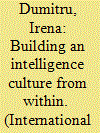

|
|
|
|
|
| Publication |
2014.
|
| Summary/Abstract |
Collective perceptions on intelligence services have been for centuries associated with a sense of mystery, obscurity, and clandestine behavior. At the same time, intelligence success could not be traditionally conceived and exercised in the absence of cover, duplicity, truth manipulation, and intentional avoidance, as well as of masks adapted to context. Therefore, intelligence would traditionally be based on secrecy and a mainly "no communication" approach. Thus, secrecy inherently marked intelligence, as both a barrier created from inside the organization towards the outside world and as a label placed by public opinion on the intelligence organization, therefore shaping knowledge of what cannot otherwise be known.
|
|
|
|
|
|
|
|
|
|
|
|
|
|
|
|
| 2 |
ID:
182603
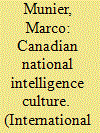

|
|
|
|
|
| Summary/Abstract |
This paper seeks to understand the nature and characteristics of Canadian national intelligence culture post–Cold War using the analytical insights of the strategic culture and intelligence culture literature. Previous studies have focused on an organizational description or historical studies of Canadian intelligence during the Cold War or after 9/11. Yet, no studies have examined the characterization of a national intelligence culture in Canada and proposed to contextualize the Canadian intelligence system in light of its national intelligence culture. Building on a culturalist approach of national intelligence systems, this paper proposes an operationalization of the national intelligence culture concept drawn on the strategic and intelligence culture literature. The paper concludes that Canada’s national intelligence culture is mostly defensive and minimalist. However, we note that recent changes in the Canadian intelligence apparatus have led to a gradual evolution of Canadian intelligence from defensive to offensive.
|
|
|
|
|
|
|
|
|
|
|
|
|
|
|
|
| 3 |
ID:
145320
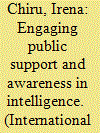

|
|
|
|
|
| Summary/Abstract |
In democracies the efficiency of a national security institution depends significantly on the way its role and mission are perceived by the intelligentsia and the general public. “Social capital,” an asset for all institutions, conditions their efficient functioning in the limits of the law. Consequently, the intelligence culture, understood as a set of explicit and implicit attitudes and behaviors related to intelligence which influence social perceptions, is fundamental for allowing the public to trust and support their country's intelligence services, given that trust is directly correlated with the efficiency of national security institutions. Political as well as security community legitimacy is acquired, preserved, validated, or eroded through actions, just as their public image is built through adequate communication policies.
|
|
|
|
|
|
|
|
|
|
|
|
|
|
|
|
| 4 |
ID:
173962
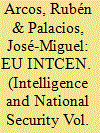

|
|
|
|
|
| Summary/Abstract |
This article aims to gain a better understanding of EU INTCEN’s analytic culture and the use of structured analytic techniques by EU analysts; an under researched topic in the intelligence studies literature. The Intelligence Analysis and Situation Centre of the European Union (EU INTCEN) is a directorate of the European Union External Action Service (EEAS) that has been characterized as an EU analytic structure similar to the State Department’s INR. The article reviews relevant literature and presents findings based on the analysis of a questionnaire on ‘Intelligence analysis and production in EU INTCEN/SITCEN, that was distributed to EU INTCEN intelligence analysts (EEAS officials having worked as analysts in EU SITCEN/INTCEN between June 2005 and June 2014), and in-depth phone interviews to better understand INTCEN analytical process. Analytic projects at EU INTCEN are initiated with Requests for Information to which replies can be received. The analysts count as well with previous contributions and assessments, open sources, and diplomatic reporting. Among other findings, the study reveals that SATs are little used in practice in spite of most EU INTCEN analyst has received some training on SATs.
|
|
|
|
|
|
|
|
|
|
|
|
|
|
|
|
| 5 |
ID:
150417
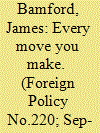

|
|
|
| 6 |
ID:
134926
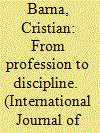

|
|
|
|
|
| Summary/Abstract |
One factor that has led to profound changes in the evolution of intelligence is the removal of many physical and ideological barriers that previously prevented communication and interaction, as existed in the Cold War era. In this ideological post-war period, in which most societies are no longer militarily threatened but rather politically, economically, culturally, and perhaps religiously, undermined, intelligence services are facing new challenges, being called upon to contribute to the reduction or removal of a series of threats and negative effects.
|
|
|
|
|
|
|
|
|
|
|
|
|
|
|
|
| 7 |
ID:
188183
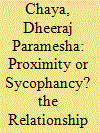

|
|
|
|
|
| Summary/Abstract |
Scholars of Intelligence Studies have extensively debated the contours of an ideal relationship between intelligence services and policy making, in which agencies can maintain analytical objectivity while having a policy impact. However, this debate has not meaningfully embraced a geographic expanse covering the Global South. This article, firstly, addresses this by offering a comprehensive analysis of the intelligence–policy relationship in India during the Nehruvian era. Secondly, it draws on the existing scholarly examinations of the global intelligence–policy relationships and argues that ‘proximity’ produces varying results in different decision-making cultures. Thirdly, the article contributes to the literature on contemporary Indian security by examining the impact on Indian intelligence of the relationship between Prime Minister Jawaharlal Nehru and B.N. Mullik, former chief of Indian intelligence and an understudied personality. It challenges the popular perception surrounding Mullik’s ‘sycophancy’ and argues that the decision-making culture that existed during the Nehruvian years demanded greater proximity, subservience and, in the worst case, sycophancy. A cost-benefit analysis presented in the article reveals that there were both pros and cons to the ‘proximity’ factor, with the former being more significant.
|
|
|
|
|
|
|
|
|
|
|
|
|
|
|
|
| 8 |
ID:
145312
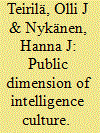

|
|
|
|
|
| Summary/Abstract |
Recent years have featured an unprecedented amount of intelligence-related public discussion in Finland. The revelations of Edward Snowden in the summer of 2013, the rise of cyber threats, and even the phenomenon of Finnish fighters in Syria have contributed to the discussion. Public debates, and the information provided, are key construction pieces for the development of intelligence legitimacy and trust between the people and the Intelligence Community (IC). The discussion contributes to transparency, often considered an essential part of 21st century governance. It also provides a window to the legality of actions that comprise the national intelligence cycle.
|
|
|
|
|
|
|
|
|
|
|
|
|
|
|
|
|
|
|
|
|